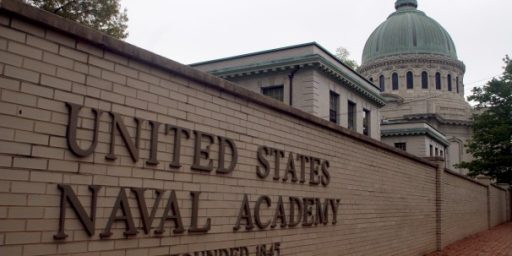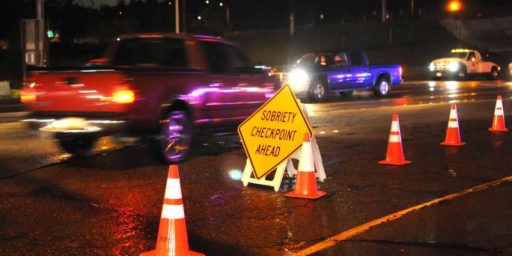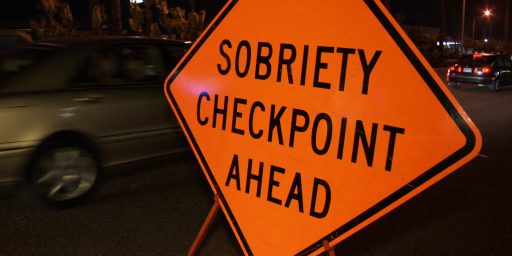Naval Academy Giving Breathalyzers to Middies
Midshipmen at the United States Naval Academy are now being limited to three drinks and are subject to random Breathalyzer tests to prove it.
In a sweeping effort to stamp out sexual assaults and other problems stemming from alcohol abuse at the U.S. Naval Academy, school officials announced yesterday that they will use Breathalyzer tests and the threat of expulsion to force midshipmen – even those 21 and over – to curtail their drinking. The enforcement tactics, which put the Naval Academy at the forefront of the “zero tolerance” movement at colleges nationwide, tolerate no underage drinking or driving under the influence of alcohol.
Since classes at the Annapolis military college resumed last month, midshipmen age 21 and older are limited to three drinks on a given night, and their blood-alcohol content is not to exceed 0.08 percent, the legal standard for drunken driving in many states, including Maryland.
Academy officials will give random breath tests to hundreds of students on weekends. Those who fail will be referred to the school’s substance abuse counseling program. Second-time offenders and those with blood-alcohol levels of 0.15 percent or higher will be disciplined through the academy’s conduct system. Punishments will include restriction to the dormitory, 5 a.m. marches and expulsion.
Neptunus Lex contrasts this treatment with the way the British Navy handles alcohol, which is to treat its sailors as adults ( I was going to type “men,” because of the additional social context at least once implied by that, but thought the better of it). I share his concerns in that regard and endorse his post for your further reading.
What concerns me perhaps more, though, is that cadets and midshipmen–and, eventually, officers in the United States Armed Forces–are expected to live according to a code of honor. Subjecting them to random Breathalyzer exams flies in the face of that and says, essentially, “I think you’re a liar.”
Unfortunately, the Naval Academy has had serious problems with its honor code and has scrapped it for a wishy-washy “Honor Concept.”
“Midshipmen are persons of integrity: They stand for that which is right.
They tell the truth and ensure that the full truth is known. They do not lie.
They embrace fairness in all actions. They ensure that work submitted as their own is their own, and that assistance received from any source is authorized and properly documented. They do not cheat.
They respect the property of others and ensure that others are able to benefit from the use of their own property. They do not steal.”
Contrast this with the West Point Honor Code: “A cadet will not lie, cheat, steal, or tolerate those who do.”
On the one hand, the former is more far-ranging. Yet, it’s lacking the directness and firmness of the latter. In particular, they eschew the non-toleration clause because it “trusts that midshipmen will enforce the high standards we have volunteered for not out of fear, but because it is the right thing to do.”
Yet, clearly they don’t. Not when they’re treating them like common criminals. Far better to lay down a set of rules and demand that they be followed than to do that.
via OTB roving correspondent Richard Gardner






The honor codes of VMI and The Citidel are extremely strict, and have at their core the same statement as West Points. And they are not followed out of fear, but out of respect of what is right. I’d say that the Naval change is the one that has decided to go the route of fear, the fear of critisism from actually requiring future leaders to actually be responsible for their actions.
You can bet that all of the savvy tavern owners in Annapolis will start selling 12oz glasses of Scotch and 40oz “mugs” of beer. If you’re limited to three drinks, they better be big!
Neptunus Lex contrasts this treatment with the way the British Navy handles alcohol, which is to treat its sailors as adults
Rum, sodomy, & the lash … we’re batting 0 for 3.
Anderson: LOL
Triumph: Although the BAC caveat rather reins that one in.
I heard one West Pointer explain their “no lying” policy very well. If you radio “Captain, did you take the hill?”, then you want to be able to trust the answer. And when you get to the point that you can not trust the answer, all sorts of things break down.
If they can’t trust them with the question “Did you have more than three drinks tonight?” then how do they expect to trust them with the question “Did you take the hill?”.
I think the drink limit policy is stupid. Not to mention that everyone is different, three drinks for me isn’t going to register the same as three drinks for somebody else, especially in the case of women, who tend to get drunk faster and stay drunk longer.
I think having a policy against illegal drinking for underage students is fine (although I think the 21 drinking age is stupid and should be lowered to 18), but breathalizers should only be given with some cause.
I think a referral for substance abuse treatment for anyone who blows more than the legal limit is absolutely rediculous. Just because somebody drinks, and may even drink a little too much on a given occassion that doesn’t mean they have a substance abuse problem. A referral for discipline if it violates rules is one thing, but the assumption that getting drunk means they have a problem is over the top IMO.
yaj: There aren’t too many hills at sea, but I don’t think that minor discrepancy undermines your point.
So much for “a drunk in every port.”
I can’t find any numbers on a cursory search on the number of prior-enlisted Middies, and Napsters (Naval Academy Prep School), but I’d guess that at least 20% of the Middies are at least 19 years old when they enter the academy, and probably 15% are 20+ when they enter (could be as old as 23 per the USNA website). So we now have a Nanny State telling folks to not get too drunk.
What most outside the military do not know about is the significant number of enlisted that are accepted into the military academies.
apparently the academy is not concerned with preparing their students for their careers…pathetic attitude. Indeed another example of the weakened state of today’s military. BTW, see ….http://news.yahoo.com/s/afp/20060914/hl_afp/afplifestylehealthalcohol
And the other thing, the Navy is treating its future officers more like children than they do those in the Navy.
The policy really should just be simple-follow the law, show up on time for work sober (in their case class), and if you are hung over and screw up, face disciplinary charges for the screw up.
When my husband was in the Navy showing up for work sober was important, but the people in charge didn’t care how drunk he got, when not on duty provided he could still do his job the next morning and he didn’t do anything illegal.
Boyd,
Check out how many middies become Marines. And believe it or not, I know of at least one USNA graduate who opted to fulfill their service in the Army. The graduates of the various academies are given the choice as to which branch they want to serve their commitment. Obviously they tend to stay with the branch their academy is most identified with, but that is not absolute.
Yes, john, I’m aware of all that (I’m
retardedretired from the Navy). I was just trying to poke fun.One could go further and say there are also folks who graduate from the Naval Academy who get Navy commissions and yet never go to sea. Be that as it may, the Navy doesn’t take too many hills, at least not in my experience.
Still, I agree with your point. I just tried to make a little joke at your expense. Sorry.
“Unfortunately, the Naval Academy has had serious problems with its honor code and has scrapped it for a wishy-washy ‘Honor Concept.'”
Somone needs to tell Mr. Joyner to check his facts.
The United States Naval Academy has always had an Honor CONCEPT rather than an Honor CODE. It has always allowed the Midshipmen to handle honor-related issues within their own ranks, and has worked quite well. It has NOT been “replaced” with a “wishy-washy” ANYTHING. Also, alcohol abuse is a CONDUCT violation, not an HONOR violation. Two different systems handling two different kinds of offenses.
For the record, I don’t like the new policy either because it treats Midshipmen like kids rather than as adults.
Zaphod
USNA ’91